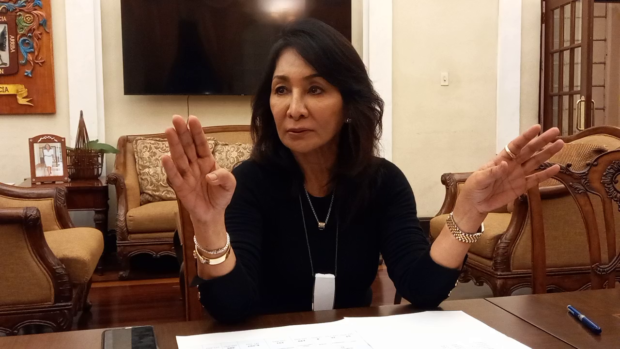CEBU CITY—Health officials in Central Visayas have until this week to stop the resurgence of coronavirus infections in Cebu province and Cebu City, or these areas will be placed again under a hard lockdown.
Dr. Mary Jean Loreche, spokesperson for the Department of Health (DOH) in the region, said the DOH’s technical advisory council in Manila had recommended placing Cebu under enhanced community quarantine (ECQ) due to the rising number of new coronavirus disease (COVID-19) cases and the discovery of SARS-CoV-2 mutations on the island.
ECQ is the country’s strictest form of quarantine.
Loreche, who is also chief pathologist of the DOH regional office, said they were given until Friday to manage the situation in Cebu so it could keep its modified general community quarantine (MGCQ) status.
Data review
“If we are going to (have another) lockdown, what will be its impact on the economy? Do we still have the means to survive?” she said in a virtual press conference on Monday.Loreche appealed to the DOH technical advisory council to give the region time to review its data. “The data they (advisory council) used did not synchronize with our data. That is why on Friday, I am presenting our data,” she said.
As of Sunday, Cebu City had recorded 16,466 COVID-19 cases, of which 3,176 were classified as active. It posted 12,565 recoveries and 725 deaths, according to the DOH.
Cebu province had 9,616 cases, 1,211 of which were active. It had 7,960 recoveries and 445 deaths.
In June 2020, Cebu City was placed under ECQ due to a surge in the number of COVID-19 cases, as well as its problem of providing critical health-care assistance to patients. It took about two months before the city was downgraded to MGCQ, the most relaxed form of community quarantine.
Testing for visitors
The DOH central office, along with the University of the Philippines (UP), the Philippine Genome Center and the UP National Institutes of Health, announced on Sunday that the N501Y and E484K “mutations of concern” were detected in samples from Central Visayas following an enhanced genomic biosurveillance. But Loreche said the regional DOH still would not recommend placing Cebu under a lockdown as this would greatly affect its economy. She instead urged the public to follow the health protocols to contain the spread of the virus.
“It is an individual’s responsibility to protect himself … We should all strive hard not to contract the virus so as not to infect our loved ones,” she said. Gov. Gwendolyn Garcia earlier expressed her disgust on plans to place the province under strict quarantine measures, saying she was ready to fight for Cebuanos.
“Don’t you dare try because I will not agree, and the Cebuanos will not agree that you will make our lives miserable. Don’t mess with us. We can take care of ourselves. I will not and never again accept a lockdown. I’ll fight for Cebu and Cebuanos because Cebu is moving on and moving forward,” she said.
On Monday, Garcia issued an executive order to drop the requirement for a swab test for the province’s visitors, bucking the strict measure taken by practically all other local governments in the country.
The province only requires tourists to present a medical certificate and to prebook accommodations.
Cebu City Mayor Edgardo Labella was keen on following Garcia’s move. In a press conference before noon Monday, he announced that he would also scrap the requirement for tourists from areas under MGCQ to present a negative COVID-19 test result before they enter the city. But less than an hour later, Labella announced in a Facebook post that the city would continue to ask tourists to present a negative reverse transcription-polymerase chain reaction (RT-PCR) test result. “After consultation with our medical experts, we’ve decided to continue to abide with DOH testing protocols. Insofar as the province’s EO (executive order), we respect it and that is the prerogative of the governor,” Labella said.
The independent group OCTA Research on Tuesday said it would still push COVID-19 testing of visitors in different parts of the country as the movement of asymptomatic patients could pose a problem.
“So that we can see the real situation in any city or province, we really need testing. We need to monitor who are [infected] because many of our countrymen are asymptomatic,” OCTA’s Bruce Ong said at the televised Laging Handa briefing.
Ong said asymptomatic patients who travel could spread the coronavirus.
Localized restrictions
Ong also noted that the upward trend in Cebu had slowed down, although he said the reproduction rate of COVID-19 in the province was still high at 1.5.Cebu’s health capacity was also good at 52 percent, he said.
OCTA is not recommending a provincewide lockdown, only localized restrictions, he said. The Department of Tourism (DOT) on Tuesday said it was up to local governments to decide what protocols to implement as they reopen destinations to tourists.
Tourism Secretary Bernadette Puyat said the DOT “fully recognizes the prerogative of our local chief executives in deciding what protocols will best suit their particular situations.”
